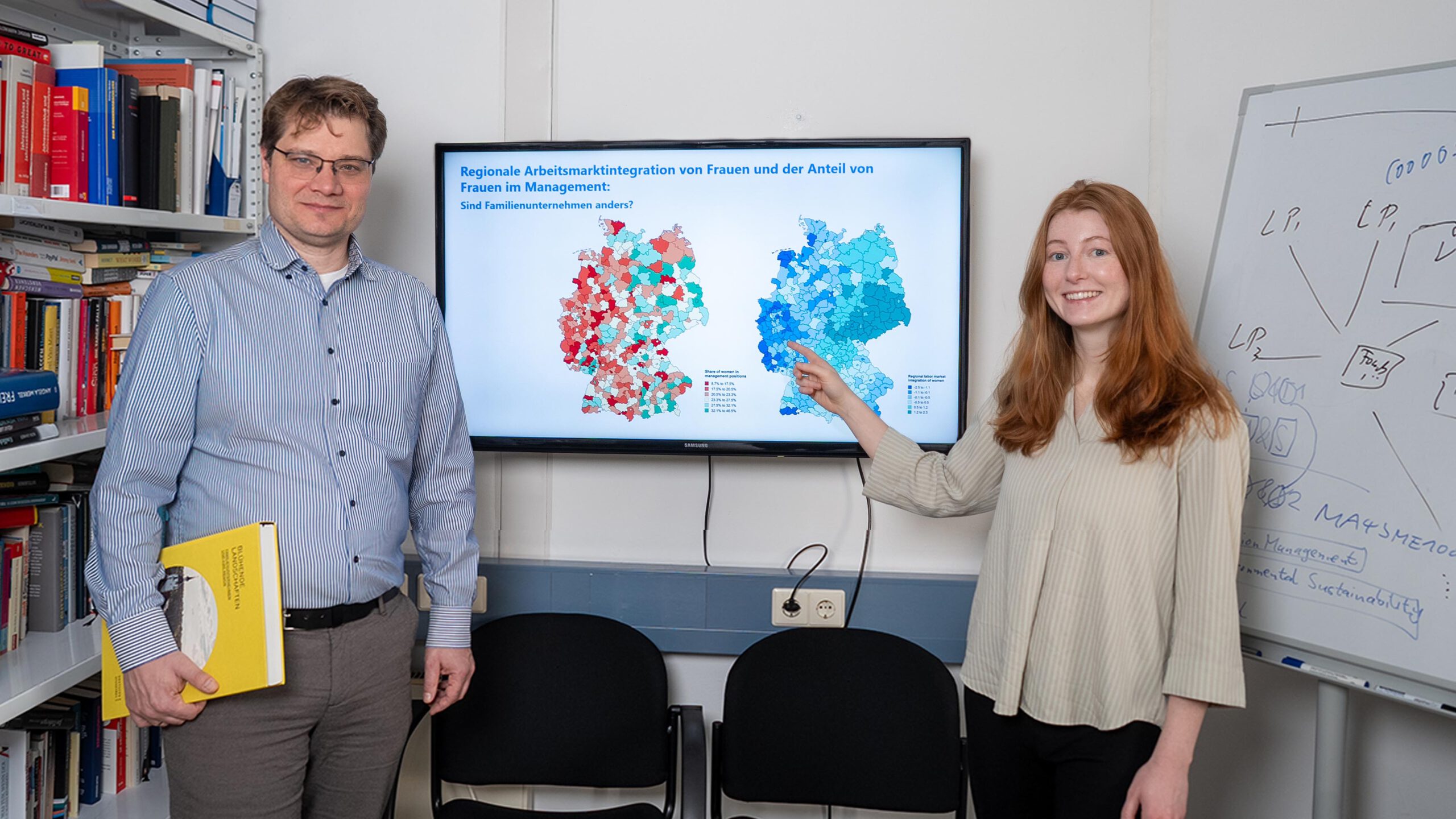Three regional factors strongly influence how often women occupy management positions in medium-sized companies. The more crèche or daycare places are available, the more fathers take parental leave and the more women generally have access to the labour market, the more likely they are to reach the management level of a company. This is the conclusion of a Trier study.
Trier/Germany, March 10, 2025 Despite all efforts to achieve greater equality, there are still significantly fewer women than men in management positions in Germany. But there are clear regional differences. A study by Natalie Welch, a doctoral candidate in business administration at the University of Trier, explains how these differences come about.
‘Three regional factors have a significant influence on women’s chances of reaching management in medium-sized companies,’ says Welch. ‘The general employment rate of women, the availability of childcare places and the proportion of men who take parental leave.’
25,000 companies analysed
In other words, the more crèche or daycare places are available, the more fathers take parental leave and the more women generally have access to the labour market, the more likely they are to reach the management level of a company. The doctoral student uses these three points to calculate a value that indicates how favourable or unfavourable the situation in the respective district is for women’s career advancement.
‘We call this value the regional labour market integration of women,’ explains project manager Prof. Jörn Block from the SME Research Centre at Trier University.
The correlation may not sound surprising at first, but has now been proven for the first time with data from around 25,000 companies with 50 to 500 employees. Interesting regional patterns have also emerged.
Clear east-west divide
‘We see a clear east-west divide,’ explains Block. ‘Probably because women were already better integrated into the labour market in GDR times. You can still see the effect today.’ In western Germany, the factors mentioned above often militate against the career advancement of women into the management of medium-sized companies.
Jena, for example, creates the best conditions for women in Germany. This results in almost 34% female managers. The front-runner is Frankfurt (Oder) with over 46 %.
Gelsenkirchen, on the other hand, brings up the rear when it comes to general conditions. The result: only 19 % of managers are women. Ansbach in Bavaria comes in at just 8% in this statistic.
Another focus of the study is on family businesses. ‘There is no general difference in the proportion of women in management between family and non-family businesses. What is interesting, however, is that regional factors have less of an influence on family businesses,’ says Natalie Welch.
Options for policy makers
The results come as a surprise to Dr Rena Haftlmeier-Seiffert. As Managing Director of the EQUA Foundation for Family Business Research, she has provided funding. ‘We see time and again that daughters take over as managing directors, which is why the impression was created that there should be more female managers in family businesses.’ She therefore assumes that there would be a higher proportion of women in family-run companies, at least in the younger age groups.
In any case, the study provides politicians with clear options for action: address cultural and structural obstacles for women, create more childcare places and enable more flexible working conditions.
‘In the next step, we want to analyse how medium-sized companies with women in management positions compare to other companies in terms of financial performance and environmental sustainability,’ Block and Welch announce.
8 March is International Women’s Day
International Women’s Day is an opportunity to discuss gender equality and reflect on the status quo. Science and research contribute to analysing and understanding the structural inequalities and social constructs that cause gender discrimination. This is why the University of Trier presents questions and research findings from women’s, gender and gender studies from six departments.
(https://www.uni-trier.de/universitaet/wichtige-anlaufstellen/team-gleichstellung/frauen-und-geschlechterforschung/frauen-und-geschlechterforschung-in-trier)
Originalpublication:
Die Studie
Welch, N., Ahrens, JP. & Block, J. Regional labor market integration of women and the share of women in management: are family firms different? Rev Reg Res (2025).
Zur Studie: (https://doi.org/10.1007/s10037-025-00228-0)
ImageSource
Christophe Heine, Universität Trier, Jörn Block und Natalie Welch.


